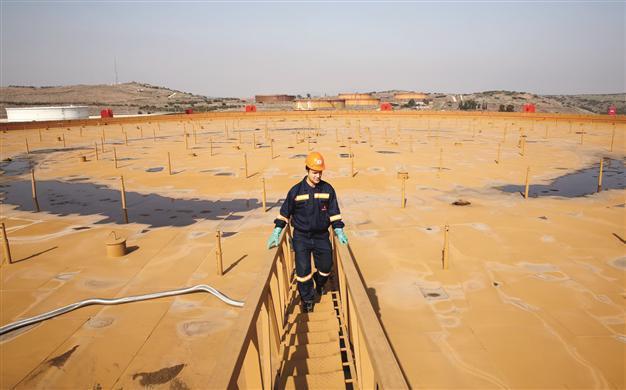Kurds offer to export 100,000 bpd of oil in Iraq row
BAGHDAD - Agence France Presse

REUTERS Photo
Iraq's autonomous Kurdish region pledged Thursday to export 100,000 barrels of oil per day through central government-controlled pipelines in a bid to resolve an impasse with Baghdad ahead of elections.
The Kurds and the government are locked in a row over energy exports, in which Baghdad has choked off funds to the northern region, draining its reserves, as the two sides spar over a national budget that would penalise the Kurds for failing to meet export targets as well as other issues tied to energy sector regulation.
As a "goodwill gesture," the Kurdistan regional government said on its website it "has offered to make a contribution to Iraq oil pipeline exports to give the negotiations the maximum chance of success." The KRG contribution will be 100,000 barrels per day from next month onwards, the statement said, adding that exports will continue "while the negotiations are proceeding in a positive direction." It added that the KRG has not set any preconditions.
Earlier this year, Arbil shipped more than one million barrels of crude directly to Turkey without Baghdad's consent, although the oil has not yet been sold on international markets.
The decision by Kurdish authorities was the latest in a years-long row between Baghdad and Arbil over energy, and spurred the central government to partly cut off funding to the three-province region.
Baghdad also complains that the Kurds do not meet export targets set by the central government but still demand their full budget allotment.
The decline in funding from Baghdad has forced Arbil to delay paying some government salaries.
Baghdad argues that all oil sales must be overseen by it, and regards any independent exports as tantamount to smuggling.
Kurdistan, which enjoys a high level of autonomy from Baghdad and has its own security forces, government and flag, has also drawn Baghdad's ire for unilaterally signing contracts with foreign energy firms.
But the two sides appeared to be agreeing on the broad outlines for a permanent deal, according to a senior US official.
Such a deal would involve a high committee of representatives from the national oil ministry, the Kurdish region and other major oil producing areas to regulate the hydrocarbons sector and the automation of payments from Baghdad to Arbil.
"And then Baghdad wants to see... that the Kurds will continue producing and exporting, and contributing revenues to the national budget base to the extent of their technical capacity... without political interference," said the official, who spoke on condition of anonymity.
The official acknowledged that the third point in particular remained "tricky."
"Both sides have long-term grievances and complaints about what is owed and what is not owed," the official said.
"That's why it was very hard even just to get an initial step like this done."
"It remains extremely extremely difficult. The political scene is super charged as we head into elections and... all the other challenges the country is facing."
In addition to disputes over natural resources, the long-standing ambition of Kurdish leaders to incorporate a swathe of territory stretching from Iran to Syria into their region, against Baghdad's strong opposition, is another major point of contention.
Diplomats and officials say the multitude of disputes are among the biggest long-term threats to Iraq's stability.
